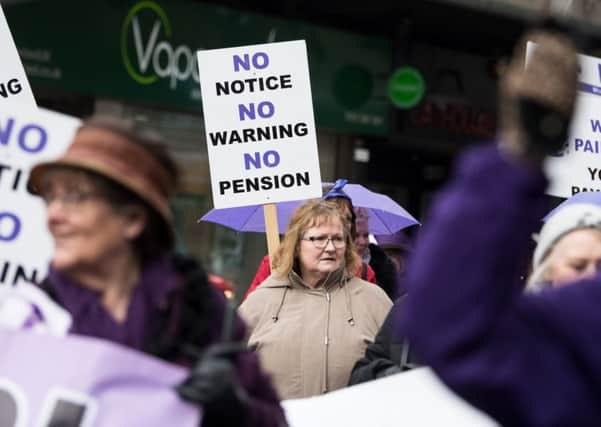7,600 East Dunbartonshire women may be affected by High Court ruling on pension changes


Nearly four million women born between April 6 1950 and April 5 1960 have been affected by the changes, made by successive governments, to raise the state pension age for women from 60 to 66.
Around 7,600 in East Dunbartonshire were born within that period, according to the latest population estimates.
Advertisement
Hide AdAdvertisement
Hide AdAnd at least 61% of them are yet to hit their state pension age, meaning they will still not be in receipt of a state pension.
Initial government plans would have seen the pension age rise in phases, from 60 in 2010 to 65 in 2020.
But in 2010, the coalition government accelerated the plans, raising the retirement age to 65 in 2018 and 66 by 2020.
Campaign group Women Against State Pension Inequality argues the changes have caused financial hardship for hundreds of thousands of women, who may struggle to find suitable employment.
Advertisement
Hide AdAdvertisement
Hide AdMany were not allowed to join private company pension schemes until the 1990s, it said, while others are carers or in poor health.
Two women – Julie Delve, 61, and Karen Glynn, 63 – took the Department for Work and Pensions to the High Court with the support of campaign group Backto60.
They argued that raising the pension age had unlawfully discriminated against them on the grounds of age and sex, and that they were not given adequate notice of the changes.
But High Court judges Lord Justice Irwin and Mrs Justice Whipple dismissed the claim “on all grounds”.
Advertisement
Hide AdAdvertisement
Hide AdIn their ruling, the judges stated: “We are saddened by the stories we read in the evidence lodged by the claimants. But our role as judges in this case is limited.
“The wider issues raised by the claimants, about whether these choices were right or wrong or good or bad, are not for us; they are for members of the public and their elected representatives.
“There was no direct discrimination on grounds of sex, because this legislation does not treat women less favourably than men in law.
“Rather, it equalises a historic asymmetry between men and women and thereby corrects historic direct discrimination against men.”
Advertisement
Hide AdAdvertisement
Hide AdDeputy leader of the Scottish Labour Party Lesley Laird said: “An incredibly disappointing verdict for WASPI women today, but the fight will not end here.
“We must now find consensus ground to renew the campaign and work towards a solution - and I’ll continue to support WASPI Scotland and local community groups in any way I can.”
Campaigners have now called on Parliament to intervene on their behalf.
A DWP spokesman welcomed the judgment, adding: “It has always been our view that the changes we made to women’s state pension age were entirely lawful and did not discriminate on any grounds.
Advertisement
Hide AdAdvertisement
Hide Ad“The court decided that arguments the claimants were not given adequate notice of changes to the state pension age could not be upheld.
“This follows the extensive communications that DWP made to publicise these changes over many years.”
He added that raising the state pension age in line with changes to life expectancy had been the policy of successive governments over many years.